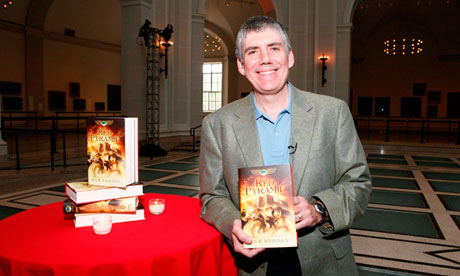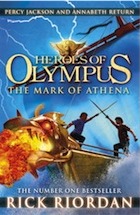The bestselling Texan author of children's fantasy adventures talks about the magic of myths and legends and their relevance to children and the modern world

Rick Riordan: 'Since Harry Potter there has been a renaissance in fantasy literature. JK Rowling opened the door for adults as well as kids.' Photograph: Amy Sussman/Getty
You are known as the Myth Maker because you have popularised ancient myths in Percy Jackson series, the Kane Chronicles, about Egypt, and the Heroes of Olympus series. Why do you think there is such an inexhaustible appetite for stories about the whims of the gods?
To a degree, the Greek and Roman mythological heroes are just the first superheroes. They appeal to children for much the same reason. These gods and heroes may have powers, but they get angry and they do the wrong thing. They are human too. Children relate to gods because they are really parental figures, who make mistakes and who seem very capricious.
 You taught classics in schools for 15 years. Do you look back at your old texts to decide which myths to mine for stories, or do you spot things around you that have echoes in the ancient world?
You taught classics in schools for 15 years. Do you look back at your old texts to decide which myths to mine for stories, or do you spot things around you that have echoes in the ancient world?
I tend to think of a myth and then explore how it would play out if it were happening in the modern-day world. I modify all the myths I use, but I stick very closely to their structure – it is the hidden teacher in me.
With a lot of them it is easy to imagine the modern context by, say, having Aries riding on a motorcycle. These myths are universal and are totally ingrained in our culture. We are still struggling with the same things, so they fit neatly into the modern world.
The villains and heroes in your books are fairly destructive, variously blowing up landmarks such as the British Museum and the New York Met. How do you decide where to pitch the level of violence?
It is very important to me that the violence is stylised and is not translated in a graphic manner. I would say it is more like action than violence. I don't talk about people being wounded in any great detail and, in fact, I go into very little grisly detail at all.
Since the release of the film Percy Jackson and The Lightning Thief two years ago there have been four Jackson book titles in the top 20 every week. Is this a heyday for children's fantasy literature?
No one spoke in terms of children's literature, as opposed to adult literature, until around the 1940s. It wasn't categorised much before then. Even Grimm's tales were written for adults. But it is true that ever since Harry Potter there has been a renaissance in fantasy literature. JK Rowling opened the door again. And the door opened for adults as well as kids. By their nature the best of these stories are universal, and for any age. But for me, when I write, I go back to the classroom. I have the children that I used to teach in mind. And then if adults want to pick the books up too, that is fine.
Full interview at The Observer
To a degree, the Greek and Roman mythological heroes are just the first superheroes. They appeal to children for much the same reason. These gods and heroes may have powers, but they get angry and they do the wrong thing. They are human too. Children relate to gods because they are really parental figures, who make mistakes and who seem very capricious.
 You taught classics in schools for 15 years. Do you look back at your old texts to decide which myths to mine for stories, or do you spot things around you that have echoes in the ancient world?
You taught classics in schools for 15 years. Do you look back at your old texts to decide which myths to mine for stories, or do you spot things around you that have echoes in the ancient world?I tend to think of a myth and then explore how it would play out if it were happening in the modern-day world. I modify all the myths I use, but I stick very closely to their structure – it is the hidden teacher in me.
With a lot of them it is easy to imagine the modern context by, say, having Aries riding on a motorcycle. These myths are universal and are totally ingrained in our culture. We are still struggling with the same things, so they fit neatly into the modern world.
The villains and heroes in your books are fairly destructive, variously blowing up landmarks such as the British Museum and the New York Met. How do you decide where to pitch the level of violence?
It is very important to me that the violence is stylised and is not translated in a graphic manner. I would say it is more like action than violence. I don't talk about people being wounded in any great detail and, in fact, I go into very little grisly detail at all.
Since the release of the film Percy Jackson and The Lightning Thief two years ago there have been four Jackson book titles in the top 20 every week. Is this a heyday for children's fantasy literature?
No one spoke in terms of children's literature, as opposed to adult literature, until around the 1940s. It wasn't categorised much before then. Even Grimm's tales were written for adults. But it is true that ever since Harry Potter there has been a renaissance in fantasy literature. JK Rowling opened the door again. And the door opened for adults as well as kids. By their nature the best of these stories are universal, and for any age. But for me, when I write, I go back to the classroom. I have the children that I used to teach in mind. And then if adults want to pick the books up too, that is fine.
Full interview at The Observer

No comments:
Post a Comment